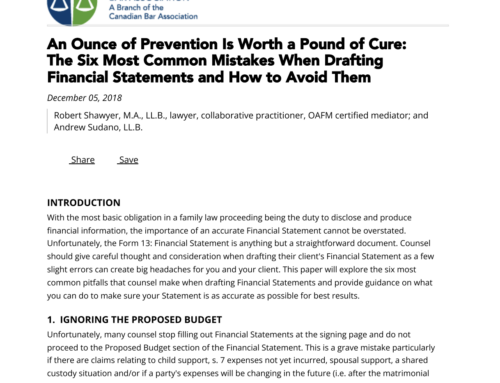In light of the recent Donald Sterling controversy engulfing the National Basketball Association, it is important to examine the difficulty Ontario family courts face when considering the admission of audio recordings into evidence, including when a recording is made without the knowledge and consent of the other party.
In Hameed v. Hameed, 2006 ONCJ 274, the Honourable Sherr J. did not admit secret recordings taken by one of the parties to family law proceeding and stated the following at paragraphs 11-13 of his reasons:
“I ruled that this evidence was inadmissible. Surreptitious recording of telephone calls by litigants in family law matters should be strongly discouraged. There is already enough conflict and mistrust in family law cases, without the parties worrying about whether the other is secretly taping them. In a constructive family law case, the professionals and the courts work with the family to rebuild trust so that the parties can learn to act together in the best interests of the child. Condoning the secret taping of the other would be destructive to this process.
I agree with Justice Henry Vogelsang who said in paras. 5 and 6 of Tatarchenko v. Tatarchenko (1998), 83 A.C.W.S. (3d) 792, [1998] O.J. No. 4685, 1998 CanLII 14087, 1998 CarswellOnt 4374 (Ont. Fam. Ct.):
There is a wide scope for potential abuse in this practice. The reliability of such evidence is very difficult to determine, even for a trial judge who has the benefit of much more opportunity to explore all of the evidence than that enjoyed by a motions judge. The suspicious and disturbing circumstances surrounding the production of this “evidence” convince me that it should be struck in its entirety and should not be before the court.
The court in deciding whether to admit such evidence will need to weigh these policy considerations against its probative value. The party seeking its admission should establish a compelling reason for doing so. The reasons that the father put forward in this matter fall well short of this standard.”
In A.F. v. J.W., 2013 ONSC 4272, the Honourable Harper J. held that while the furtive taping of the other party should be generally discouraged, “in far too many cases, like the matter before me, the goal of building trust became masked by one party saying one thing in public and doing something very different when she thought she was safe from scrutiny.” Accordingly, Harper J. found that the behavior by one party in the recording demonstrated that her compliance with his Honour’s prior court order was merely a façade and that her actions, as indicated on the recordings, were emotionally damaging to the children.
While the case law suggests that it is entirely fact dependent as to when a court will admit audio recordings made without the other party’s consent into evidence, what remains abundantly clear is that in today’s world “private” is becoming increasingly equivalent to “public.”
ABOUT THE AUTHOR
Andrew Sudano




